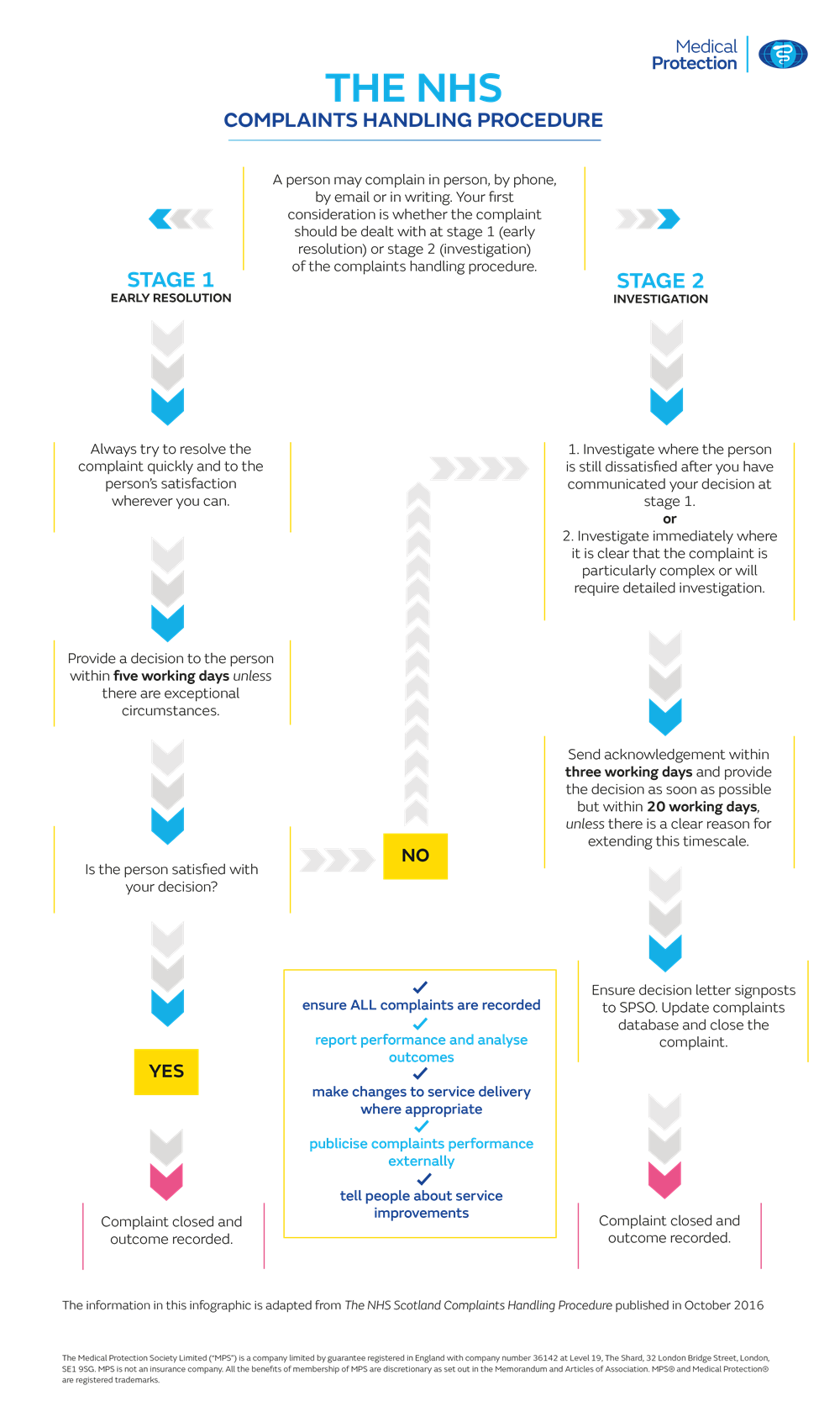The new Complaints Handling Procedure places an emphasis on empowering all staff to resolve issues “on-the-spot” where they can. You also have to make sure you record all complaints, even those resolved efficiently. Sara Dawson explores all the changes below
Read this article to:
- Learn about the changes to complaints procedures in Scotland
- Find out what you need to do to comply with the new procedure
- See an infographic clearly explaining the new process
A more patient-centred and open approach to NHS complaints handling has been launched in Scotland – it’s being called the Complaints Handling Procedure or CHP.
The new procedure follows recommendations made in the Scottish Health Council’s 2014 report entitled Listening and Learning – How feedback, Comments, Concerns and Complaints Can Improve NHS Services in Scotland.
It has been developed by a number of key national organisations and will complement the new Duty of Candour regulations, which promote a culture of transparency in NHS Scotland.
The new procedure brings the NHS in line with other public services in Scotland, aiming to have one procedure that applies to them all.
Following its implementation, compliance with the new procedure will be monitored by the Scottish Government with the support of the Scottish Public Services Ombudsman (SPSO).
A ‘Public-Facing Document’ has been produced providing information on the new complaints procedure.
When?
All NHS bodies (including GP practices) were required to have adopted both the CHP and the ‘Public-Facing Document’ by 1 April 2017.
NHS Boards must have confirmed implementation of the new procedure to the Scottish Government by 7 April 2017.
NHS Boards must complete a self-assessment to demonstrate that their implementation meets the requirements. This can be carried out by completing the form provided in Appendix A of the CHP document.
How?
The new CHP is provided as a template for NHS Boards and primary care services to adapt and adopt.
Each NHS Body or service provider (including GP practices) should already have a Feedback and Complaints Officer who is responsible for handling feedback, comments, concerns and complaints.
GP practices should note that there are sections of the new CHP that do not relate to the services that they provide, and where this is the case, they should amend the procedure appropriately.
What do practices need to do?
- Ensure the new procedures are published and accessible at all times, taking into account those with special needs, for example, this may involve staff writing the complaint for the complainant.
- Record all complaints, including those handled at an early resolution stage (page 28 of the CHP outlines what needs to be recorded), which must also be reported on a quarterly basis to the Health Board who pass this on for national recording.
- Use new key performance indicators (KPIs) to measure performance (for example, whether staff are learning from the complaints).
- Train staff on the new procedures, so they can identify complaints and use a range of appropriate measures to resolve them. Where possible, “on-the-spot” resolution is to be encouraged (and recorded when used). The Scottish Government is developing training materials with NHS Education for Scotland. There is also information on the SPSO’s SPSO’s Valuing Complaints website.
- Ensure staff can distinguish between feedback, comments, concerns or complaints and ensure the issues raised are handled through the appropriate procedures.
- Determine whether a Significant Event Analysis (SEA) is required.
- Identify whether any other NHS bodies are included in the complaint, and communicate appropriately.
- Produce a report and final response to the complainant at the end of each investigation (pages 23 and 24 of the CHP outline what should be included in the report).
- Publish yearly reports outlining the types of complaints received, the stage the complaints were resolved at, the time taken to resolve the complaint and the actions taken to improve services.
- Maintain confidentiality throughout the process.
View our infographic outlining the key stages of the new NHS Complaints Handling Procedure

Further resources
Read our new Factsheet that details everything you need to know about the new Complaints Handling Procedure